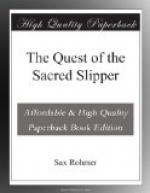The lower pane of the window was smashed. Blood was trickling down upon the floor from the jagged edges of the glass.
“Hullo there! Open the door! Open the door!”
Bells were going all over the place now; sounds of running footsteps came from below; but Mostyn stood staring at the broken window and at the solid iron bars which protected it without, which were intact, substantial—which showed him that nothing human could possibly have entered.
Yet the case was shattered, the holy slipper lay close beside him upon the floor, and from the broken window-pane blood was falling —drip-drip-drip . . .
That was the story as I heard it half an hour later. For Inspector Bristol, apprised of the happening, was promptly on the scene; and knowing how keen was my interest in the matter, he rang me up immediately. I arrived soon after Bristol and found a perplexed group surrounding the uncanny slipper of the Prophet. No one had dared to touch it; the dread vengeance of Hassan of Aleppo would visit any unbeliever who ventured to lay hand upon the holy, bloody thing. Well we knew it, and as though it had been a venomous scorpion we, a company of up-to-date, prosaic men of affairs, stood around that dilapidated markoob, and kept a respectful distance.
Mostyn, an odd figure in pyjamas and dressing-gown, turned his pale, intellectual face to me as I entered.
“It will have to be put back . . . secretly,” he said.
His voice was very unsteady. Bristol nodded grimly and glanced at the two constables, who, with a plain-clothes man unknown to me, made up that midnight company.
“I’ll do it, sir,” said one of the constables suddenly.
“One moment”—Mostyn raised his hand!
In the ensuing silence I could hear the heavy breathing of those around me. We were all looking at the slipper, I think.
“Do you understand, fully,” the curator continued, “the risk you run?”
“I think so, sir,” answered the constable; “but I’m prepared to chance it.”
“The hands,” resumed Mostyn slowly, “of those who hitherto have ventured to touch it have been”—he hesitated—“cut off.”
“Your career in the Force would be finished if it happened to you, my lad,” said Bristol shortly.
“I suppose they’d look after me,” said the man, with grim humour.
“They would if you met with—an accident, in the discharge of your duty,” replied the inspector; “but I haven’t ordered you to do it, and I’m not going to.”
“All right, sir,” said the man, with a sort of studied truculence, “I’ll take my chance.”
I tried to stop him; Mostyn, too, stepped forward, and Bristol swore frankly. But it was all of no avail.
A sort of chill seemed to claim my very soul when I saw the constable stoop, unconcernedly pick up the slipper, and replace it in the broken case.
It was out of a silence cathedral-like, awesome, that he spoke.




